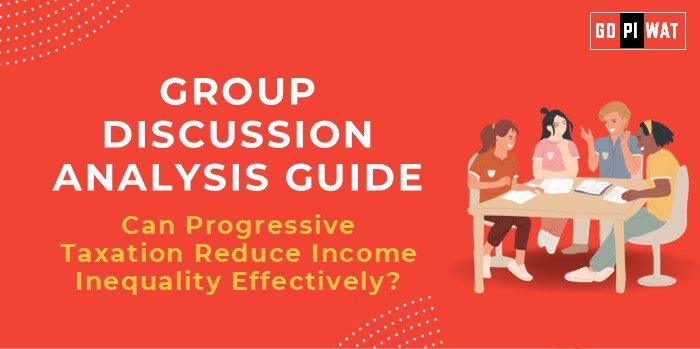📋 Group Discussion Analysis Guide: Can Progressive Taxation Reduce Income Inequality Effectively?
🌐 Introduction to Progressive Taxation and Income Inequality
- Context Setting: Progressive taxation is a system where tax rates increase with income, aimed at reducing economic disparities. This topic is highly relevant in a world grappling with widening wealth gaps, especially as nations explore fiscal measures to ensure equitable growth.
- Background: Originating in the late 19th century with the U.S. and European tax reforms, progressive taxation aims to redistribute wealth and fund public services. Recent debates have reignited discussions on its efficacy amidst growing income inequality globally.
📊 Quick Facts and Key Statistics
• 🌍 Global Wealth Inequality: The richest 1% own 45% of global wealth (Oxfam, 2023).
• 💰 Tax Progressivity in Nordic Countries: Top income tax rates exceed 50%, contributing to some of the lowest inequality levels globally (OECD, 2023).
• 🇮🇳 India’s Tax Structure: The top tax bracket is 30%, covering individuals earning above ₹10 lakh annually (Union Budget, 2024).
• 🇺🇸 U.S. Trends: Income inequality peaked in 2021, despite a progressive tax system (Federal Reserve, 2023).
• 💰 Tax Progressivity in Nordic Countries: Top income tax rates exceed 50%, contributing to some of the lowest inequality levels globally (OECD, 2023).
• 🇮🇳 India’s Tax Structure: The top tax bracket is 30%, covering individuals earning above ₹10 lakh annually (Union Budget, 2024).
• 🇺🇸 U.S. Trends: Income inequality peaked in 2021, despite a progressive tax system (Federal Reserve, 2023).
👥 Stakeholders and Their Roles
- Governments: Design and enforce tax policies; direct funds to welfare programs.
- High-Income Individuals and Corporations: Major taxpayers under progressive regimes; often engage in tax planning.
- Middle and Lower-Income Groups: Beneficiaries of redistributed wealth via public services.
- International Bodies (OECD, IMF): Advocate for global tax standards to address inequality.
🏆 Achievements and Challenges
- Achievements:
- 🌟 Social Equity: Nordic countries showcase low Gini coefficients due to high taxation and welfare spending.
- 📈 Economic Growth: Redistribution stimulates consumption among lower-income groups.
- 💡 Fiscal Benefits: Increased government revenue for public investment.
- Challenges:
- ⚠️ Tax Avoidance: Wealthy individuals exploit loopholes and tax havens.
- 🔄 Economic Distortion: High taxes may discourage investment and entrepreneurship.
- 📉 Global Comparisons: Developing countries like India struggle to implement effective progressivity due to administrative limitations.
📋 Structured Arguments for Discussion
- Supporting Stance: “Progressive taxation is a proven tool to reduce inequality, as seen in Nordic countries where high tax revenues fund comprehensive social welfare programs.”
- Opposing Stance: “Excessive taxation on the rich can hinder economic growth and innovation, leading to capital flight.”
- Balanced Perspective: “While progressive taxation is essential for redistribution, it must be complemented with tax compliance reforms and welfare efficiency.”
🗣️ Effective Discussion Approaches
- Opening Approaches:
- 💬 “Income inequality is a growing concern globally, with progressive taxation emerging as a vital solution.”
- 💬 “Despite its intent to reduce inequality, progressive taxation faces challenges like tax evasion and enforcement.”
- Counter-Argument Handling: Highlight international best practices, e.g., digital tax tracking systems in Nordic countries.
🔍 Strategic Analysis of Strengths and Weaknesses
- 🏅 Strengths: Redistribution, reduced inequality, fiscal sustainability.
- ⚠️ Weaknesses: Compliance issues, administrative challenges.
- 🌱 Opportunities: Technology in tax collection, global cooperation on tax evasion.
- ⚡ Threats: Political resistance, capital outflows.
🎓 Connecting with B-School Applications
- Real-World Applications: Linking taxation to sustainable development goals and business ethics.
- Sample Interview Questions:
- 💡 “How can progressive taxation balance equity and economic growth?”
- 💡 “What role do businesses play in ensuring tax compliance?”
- Insights for Students: Explore taxation policies for projects in economics and governance.


